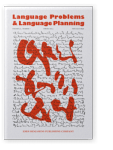Vol. 37:1 (2013) ► pp.47–70
Religion and artificial languages at the turn of the twentieth century
Ostwald and Zamenhof
What kinds of ideas and motivations drove artificial language promoters to face the skepticism, if not the mockery, of public opinion and advocate for one or another artificial language as the best solution to the communication predicament of the world? Were they purely instrumental ideas, or were they part and parcel of a distinctively religious agenda? This article contends that very much like other social and political movements of the turn of the twentieth century, such as Socialism, Nationalism, or Positivism, the longing for an international language, at least in the way it was conceived of by Ostwald and Zamenhof, also shares the basic characteristics of a secular religion: a message of meaning, a set of moral principles, and a message of salvation. More concretely, this article analyses Ostwald’s connection with the German Monist movement, and explains the role of Ido in his new religion, “Energism.” Similarly, it explores the connection between Zamenhof’s “Homaranism” and Reform Judaism, as developed by Abraham Geiger and Hermann Cohen.
Cited by (4)
Cited by 4 other publications
This list is based on CrossRef data as of 8 july 2024. Please note that it may not be complete. Sources presented here have been supplied by the respective publishers. Any errors therein should be reported to them.
